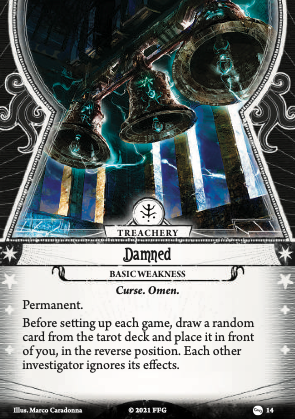Since this only applies to you and the tarot deck's contents are known, there is a list of effects you might see from this weakness. I've reworded them accordingly here, and have categorized them in groups based on the general typing. I've tried to put the groups in order of least-to-most threatening, but this can greatly vary depending on the character, build, or mission.
- "Don't Be Defeated" set - Since you generally don't want to be defeated in the first place, these are generally minor items to keep an eye on.
- If you are defeated this game, you earn -2 experience during its resolution.
- If you are defeated during this game, suffer 1 trauma of your choice during its resolution.
- Additional damage/horror sources. You might have to play a bit more carefully, but these probably won't do more than things like Psychosis, Hypochondria, Internal Injury, Chronophobia, or Nihilism might do to you, and at least you don't have to worry about losing a draw to them or taking actions to cancel them later.
- You get -1 health.
- You get -1 sanity.
- After you reveal an token during a skill test, you must either take 1 damage or 1 horror.
- Initial deck manipulation - This is somewhat annoying, but if you're running multiple copies of things, it's often not fatal. It's about what you'd see with Through the Gates.
- When the game begins, you search your deck for an Ally asset, remove it from the game, and shuffle your deck.
- When the game begins, you discard the top 5 cards of your deck. Shuffle each discarded weakness into your deck.
- New basic weakness - It's as good or as bad as the weakness you get. Just be aware if you happen to get a weakness that might not be removed as easily as you like, if you happen to be toying with Dark Pact, Doomed, or Offer You Cannot Refuse - though I believe the latter has the amusing consequence of giving you 2 XP with no permanent downside, if you properly handle it for that single scenario.
- Add 1 random basic weakness to your deck. Remove it after the game ends.
- Capacity Changers - This adjusts how much you can hold. Many characters will have some wiggle room with these effects, but those that are hit by them will often be hit particularly hard. Remember, the slot set is Accessory, Ally, Arcane x2, Body, Hand x2 and Tarot, since footwear is still not a slot.
- Decrease your maximum hand size by 3.
- You have 3 fewer slots, each of a different type, chosen by you when the game begins.
- Messes with your tests - The swing on these is pretty hefty, depending on if the skill you get is relevant or not. Note that unlike some other cards, these apply to the first test you perform each round, meaning these may hit during the Mythos Phase. If this happens to hit one of your main stats... Ow.
- During the first test you perform each round, you get -1 .
- During the first test you perform each round, you get -1 .
- During the first test you perform each round, you get -1 .
- During the first test you perform each round, you get -1 .
- Once each agenda, the first time you reveal an token, cancel it and treat it as a -5 token instead.
- Good luck ignoring this - Effects that other investigators have no easy way to ignore, due to the tarot manipulating a global state. These may not be notable, depending on the scenario card or on just how smoothly your group works.
- When the game begins, replace the highest non-negative token in the chaos bag with a token. Swap them back after the game ends.
- The final agenda of the game enters play with 1 doom on it.
- Setup/Turn 1 Modifiers - Most characters prefer to setup on turn 1, and these tend to interfere with that. How bad this is depends on how much setup your character needs to work out of the gate, how much your character can afford to dally, how lucky you are in getting what you need despite lesser opportunities, and if other characters are able to help make up for the gap until turn 2 or 3.
- You cannot mulligan or replace weaknesses in your opening hand (resolve their revelation abilities when the game begins).
- During your first turn, you have 2 fewer actions to take.
- During the first round of the game, you cannot play assets.
- You begin the game with 2 fewer cards in your opening hand and cannot draw cards during your first turn.
- You begin the game with 3 fewer resources and cannot gain resources during your first turn.
The full effect list is varied enough that this is bound to be a very swingy weakness. In general, I would say the first three groups (7/22) are fairly negligible, the setup group (5/22) will hit most characters fairly hard, and the rest (10/22) will vary greatly depending on the exact scenario and character. All in all, I think the overall effect of this is fairly average for a weakness, though at least most of the time, you'll have one less weakness in your deck to draw.
